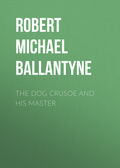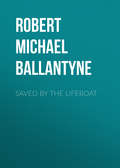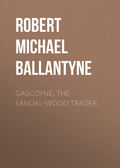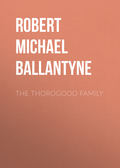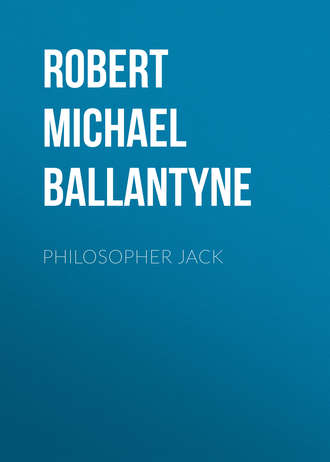
Robert Michael Ballantyne
Philosopher Jack
Chapter Eleven
Return of the Wanderer
Great was the anxiety of Edwin Jack as he walked, with light foot and fluttering heart, over the Border hills and drew near to the old home. He had not heard from his father for nearly a year. Were they all well? had they struggled out of their difficulties with the funds he had sent them. Was there no empty chair? Such and similar thoughts hurried through his mind as he went along, until he was forced to run for relief. There was a rocky ridge of land in front of him. From the top of this he knew the cottage could be seen. Panting with exertion when he gained the top, he sat down on a mass of rock and gazed at the old place till tears disturbed his vision. There it stood as of yore—no change in the general aspect of things, though there did seem one or two improvements about the cottage. But he did not gaze long. Starting up again he hurried on.
At last he stood in the midst of the old home-circle—all well, and, thank God, not one absent!
Philosopher though he was, he could not reason down the tears of joy that blinded, and the lump in his throat that well-nigh choked him. After the first wild miscellaneous embrace all round was over, Jack (or Teddie, as the home-circle called him) found relief by catching up Dobbin and burying his face in his neck and curls, regardless of the treacle with which that gentleman was plentifully besmeared.
“I’ve got bad news for you, Teddie, my boy,” said his father, after they had moderated a little.
“Nobody ill or—dead?” asked Jack, with a look of anxiety.
“No, nobody.”
“Then I’m prepared for any other kind of bad news,” said our philosopher with a quiet smile.
“The Blankow Bank,” said his father, laying a hand impressively on his shoulder, “has failed, and every penny of your gold is gone!”
The family had become very grave. Jack looked from one to the other with a bewildered air.
“You are jesting, father.”
“No, my boy; I would that it were not true. The distress that is abroad in the land because of this calamity is very great. Not only is all your fortune gone, Ted, but anything that you may have brought home with you will be taken to pay the creditors of the bank; and they require so much money that it would ruin you, though you had thousands upon thousands of pounds.”
A strange smile flitted across the youth’s face as he replied—
“What I brought home with me won’t benefit them much, for it lies with the wreck of the Rainbow at the bottom of the sea.”
This was indeed a surprise to the old couple, who now learned, for the first time, that the wrecked ship, about which a rumour had just reached them, was that in which their son had come home.
“But, father,” continued Jack, with a look of deepening anxiety, “if this be as you say, then my comrades must also be ruined, for their gold was all invested by Mr Wilkins in the same bank.”
“All ruined,” replied the old man in a sad tone. “Mr Wilkins himself is bankrupt—the first call brought him and many others down.”
“And yourself father; I hope you had no shares in it.”
“None, my boy, thank God. Prosperity has attended me ever since I got the first money you sent home. That saved me, Teddie.”
A gleam of joy overspread Philosopher Jack’s countenance as he started to his feet.
“Then am I well and undeservedly rewarded, daddy,” he exclaimed; “but all this news is pretty tough. I must go out to tackle it. I’ll be back in a few minutes.”
He sprang through the cottage door and sped away over the moor like a greyhound. Reaching the top of a rising ground—from which he could see a boundless stretch of border-land, with the sea in the far distance and the sun setting in a flood of golden light—he drew himself up, and pushing back the hair from his temples with both hands, stood gazing wistfully into the radiant glory.
“So like a dream—so like a dream!” he murmured. “It was God who gave; surely it is He who has taken away. Can there be anything but good in all this?”
His hands dropped to his side as he spoke, and he sauntered slowly down the slope on which he stood. Entering a small plantation of fir-trees at the foot of it, he disappeared.
When he returned to the cottage all trace of strong feeling was gone. “We won’t talk of the bank to-night,” he said, “let’s be jolly,” and jolly he was accordingly. Not only so, but he made Dobbin jolly too, by supplying him with such a number of treacle-pieces that the child could hardly gasp his refusal of the last slice offered, and was made sticky from the ends of his filthy fingers to the crown of his curly head.
It is not necessary, nor would it be pleasant to describe minutely the effect of the “bad news” on the other members of our gold-digging party. Captain Samson and Watty Wilkins took it well, but Polly and Simon O’Rook could not easily reconcile themselves to their fate. The former, it is true, sorrowed not for herself, but for her father. O’Rook, however, was more selfish, and came down very heavily on what he called his “luck.”
“Sure it’s a misfortunate pig I’ve been iver since I left Owld Ireland,” he remarked to his pipe one day after dinner, being alone with that implement at the time; “an no sooner does the first stroke of good luck befall me, an me fortune’s made intirely, than whoop! down goes the whole consarn to the bottom of the say. It’s well, hows’ever, that ye didn’t go down yerself along with it, Simon. Ye’ve raison to be thankful for that, anyhow.”
If O’Rook’s pipe did not offer him a comforting reply it appeared to console him with its fumes, for after a pause, during which the smoke played voluminously about his nose, he wrinkled his visage into a smile of good humour.
“Now, Simon,” he said, rising and putting the black little implement in his pocket, “you’re in a fit state to go an’ comfort the widdy.”
Saying which he went out of the cheap refreshment room in which he had dined, and betook himself to the principal street of the city, whose name we have already declined to mention.
To explain his remark, we may state here that after the most diligent inquiry without success, the Irishman had, by the merest chance, discovered the widow of David Ban— in this very city, to which he had accompanied Philosopher Jack and Captain Samson, after clearly ascertaining that every vestige of the wreck of the Rainbow had disappeared, and that all his gold was irrevocably gone. Walking along the principal street one day, he had been attracted by a temperance eating-house named the “Holly Tree.” Entering it for the purpose of, as he said, “revictualling the ship,” he was rooted to the spot by hearing a customer call out, “Another cup of coffee, please, Mrs Bancroft,” while at the same moment an assistant at the counter addressed the comely woman, who replied, “Yes, sir,” by the name of “Lucy.” Could proof be more conclusive? Upon inquiry “Lucy” turned out in very truth to be the widow of David Bancroft, and the lock of hair corresponded. Of course O’Rook revealed to her the sad circumstances connected with her husband’s end. To say that Mrs Bancroft was overwhelmed with grief would not be true. She had long mourned him as dead, and although the information, corroborated as it afterwards was by Edwin Jack and Captain Samson, did re-open the old wound to some extent, she nevertheless bore it heroically, and took Simon O’Rook’s comforting observations in good part. But we must not anticipate. Let us return to Watty Wilkins.
Having broken the news of Ben Trench’s death to the Bailie and his family—and a terrible duty he found it to be,—Watty went straight to his father’s house. We drop the curtain on the meeting. The joy of the elder Wilkins can only be fully understood by those who can say of an only son, “He was lost and is found.”
“Now, Watty, dear boy,” said Mr Wilkins when they came to talk of ordinary matters, “God has mingled mercy with my sorrows. My business has indeed been ruined, and I have passed through the bankruptcy court; but I am by no means so unfortunate as hundreds of people who have been reduced to absolute poverty by this crash. You remember my brother James—Uncle Jimmy? well, he has got a flourishing business in the West Indies. For some years past he had been meditating the establishment of an agency in connection with it in this city. The moment he heard of my failure he offered to make me his agent here, with a good salary. Of course I was only too glad and thankful to accept the offer, and after my affairs were wound up, entered upon the office. So now, you see, here I am, through God’s goodness, still inhabiting the old house, which I now rent from the person who purchased it. Of course I can no longer keep a carriage, and it will cost me some calculation and economy to make the two ends meet, but these are small matters.”
“Oh, father, I’m so glad and thankful!” said Watty with sparkling eyes.
“But,” continued Mr Wilkins, with a look of profound gravity, “at present I happen to be troubled with a great difficulty.”
“What’s that?” asked his little son, with a ready sympathy that was natural to him, and which his recent experiences had rendered much more powerful.
“I find the nature of my duties too much for me,” replied Mr Wilkins with a peculiar smile, “and it is almost impossible that I can get along without a clever, honest, intelligent clerk, or, shall we say, secretary—a character that is not easily found in these degenerate days. Can you recommend one, Watty?”
“O yes,” cried the youth, springing up and seizing his father’s hand in both of his; “you mean me! Don’t you, now? You can’t get on without me.”
Watty felt inclined to dance a hornpipe, but he sat down instead, and, covering his face with his hands, burst into tears of joy. Being a tender-hearted man, Mr Wilkins could not help joining him, but in a moderate degree. We will leave them thus engaged, merely remarking that if the act was a weakness, it nevertheless seemed to do them a world of good.
After a considerable time had elapsed, Philosopher Jack left the Border cottage one day, went up to town, and presented himself at his old lodgings to Mrs Niven. That lady’s feelings, under the influence of surprise, had a tendency, as we have shown, to lay her flat on the floor. But the faithful Peggy had come to understand her tendencies, and was usually too much for her. When her old lodger made his appearance in her parlour, Mrs Niven exhibited symptoms which caused Peggy to glide swiftly forward and receive her in her arms, whence she was transferred to an easy-chair.
Recovering, she gave Jack what, in the circumstances, was a hearty welcome.
“Losh me, laddie, ye’ll be the death o’ me!”
“I hope not, Mrs Niven,” said Jack, laughing, as he shook her hand heartily and sat down, “for my own sake as well as yours; because I have come to take my old room if it is vacant.”
“Yer auld room, Maister Jack!” exclaimed the bewildered woman.
“Yes, if it is not already occupied.”
“The yin wi’ the reeky lum and the view o’ chimbley-pots frae the wundy?”
“The same. I hope I can have it, for I’m going to college again, and I’ve an affection for the old place, despite the smoky chimney and the cans on the cats’ parade.”
“Yer jokin’, Maister Jack.”
“Indeed I am not, Mrs Niven.”
“They telt me ye was in Callyforny, an had made ’eer fortin there by howkin’ gold.”
“Well, they told the truth, my good woman, but I happened to invest all in Blankow Bank shares, and—”
“Wow! wow!” exclaimed Mrs Niven, whimpering, for she understood full well the meaning of that, “an’ ’ee’ve been ruined! Oh dear! Weel, weel, ay, ay, an it’s come to that. Jist like my kind freen’ Maister Black. Losh me! man,” she added in a sudden burst of indignation, “what for disna the Government order a penny subscription ower the hail kingdom to git the puir guiltless shareholders oot o’ their diffeeculties?”
Philosopher Jack declined to enter upon so subtle a question, but after finding that his old room was vacant, retook it, and then went out to the region of the docks to pay a visit to Captain Samson. He found that old salt in possession of his old lodging, but it was wonderfully changed, and, perhaps, not for the better. Polly was there, however, and her presence would have made any place charming.
“Sit down. There is an empty keg to offer a friend,” said the captain, looking round the almost empty room. “You see they’ve cleared me out. Had to sell everything a’most.”
This was true. The marine stores, coils of rope, kegs, charts, telescopes, log-lines, sextants, foreign shells, model ships, Chinese idols—all were gone, excepting a table, a chair, a child’s crib in a corner, and the hammock, which latter looked more like an overwhelmingly heavy cloud than ever, as it hung over the clean but desolate scene.
“But we’re going to have such a nice tea,” said Polly, “and you shall stay and have some.”
She bustled about the fire, but it had so little heart that even her coaxing nearly failed to make it burn. Jack offered to assist.
“Take care,” said Polly with some anxiety; “if you cough or sneeze you’ll put it out.”
“But I promise neither to cough nor sneeze,” said Jack.
Under their united efforts the fire blazed, and tea with buttered toast ere long smoked on the board.
“Polly’s going to London,” said the captain suddenly—almost fiercely.
“Yes,” said Polly, hastening to explain; “you see, my aunt Maria has been so good as to offer to take me to live with her and put me to school.”
“Ha!” said the captain, almost blowing the buttered toast out of his mouth with contempt, “and Aunt Maria says she’ll make a lady of Polly! Think o’ that, Jack; make a lady out of an angel!”
The captain was so tickled with the idea that he went off into a roar of sarcastic laughter.
“I’ll tell ’ee what it is, Jack,” he continued on recovering, “I shouldn’t wonder it in the course of a few months’ residence with her, Polly was to make a lady out of Aunt Maria—supposin’ that to be possible.”
“Oh! father,” remonstrated Polly.
“Come,” cried the captain savagely, “give us a nor’-wester—that’s it; another—thank ’ee. The fact is, I’m goin’ in for nor’-westers durin’ the next fortnight—goin’ to have it blow a regular hurricane of ’em.”
Philosopher Jack hoped, if at all allowable, that he might be permitted to come under the influence of the gale, and then asked why Polly was leaving her father.
“She’s not leavin’ me, bless you,” said the captain, “it’s me that’s leavin’ her. The fact is, I’ve got a ship. What’s left of me is not over young, but it’s uncommon tough, so I mean to use it up as long as it lasts for Polly. I’m off to the East Indies in two or three weeks. If it hadn’t been for this Aunt Maria I shouldn’t have known what to do for Polly, so I’ve no call to abuse the stupid old thing. A lady, indeed—ha!”
“You might have been quite sure that my father’s house would have been open to Polly,” said Jack quite warmly, “or Mr Wilkins’s, for the matter of that.”
“I know it lad, I know it” returned the captain, slapping his friend on the shoulder, “but after all, this Aunt Maria—this lady-like individual—is the most natural protector. But now, tell me, what of O’Rook?”
“I know nothing of him. Haven’t seen him for several days. When I last met him he seemed to be much depressed, poor fellow. I don’t wonder, considering the fortune he has lost. However, Wilkins’s father is sure to do the best he can for him. He feels so deeply having led him and the rest of us into this—though it was no fault of his, and he went in and suffered along with us. I couldn’t understand, however, what O’Rook meant by some wild remarks he made the other day about taking to the temperance line and going in for coffee and mutton chops up a holly-tree. I hope it hasn’t unseated his reason, poor fellow.”
While the trio were thus discussing O’Rook over a cup of tea, that bold Irishman was busily engaged “comforting the widdy” over a cup of coffee in Mrs Bancroft’s private parlour.
It is only just to O’Rook to say that he originally sought the widow from a simple desire to tell her of her husband’s sad end, which, as we have seen, had made a deep impression on his sympathetic heart. When, however, he found that the widow was young, cheery, and good-looking, his sympathy was naturally increased, and the feeling was not unnaturally intensified when he found her engaged in the management of so excellent an institution as the “Holly Tree Public House without Drink.” At first O’Rook confined his visits to pure sympathy; then, when he had allowed a “raisonable” time to elapse, he made somewhat warmer approaches, and finally laid siege to the widow’s heart. But the widow was obdurate.
“Why won’t ye have me, now?” asked the poor man one evening, with a perplexed look; “sure it’s not bad-lookin’ I am, though I’ve no occasion to boast of gud looks neither.”
“No, it’s not your looks,” said Mrs Bancroft with a laugh, as she raised her eyes from her knitting and looked at her sister Flo, who sat opposite, also knitting, and who took a smiling but comparatively indifferent view of the matter.
“Then it must be because I’m not owld enough. Sure if ye wait a year or two I’ll be as owld as yourself, every bit,” said O’Rook.
“No, it’s not that either,” said the widow.
“Ah, then, it can’t be because I’m poor,” persisted O’Rook, “for with this good business you don’t want money, an’ I’m great at cookin’, besides havin’ the willin’ hands that can turn to a’most anything. If ye’d seen me diggin’ for goold, bad luck to it, ye’d belaive what I tell ye. Ah!” he added with a sigh, “it’s a rich man I’d have been this day if that ship had only kep’ afloat a few hours longer. Well, well, I needn’t grumble, when me own comrades, that thought it so safe in the Blankow Bank, are about as badly off as me. When was it they began to suspec’ the bank was shaky?”
“Oh, long ago,” said Mrs Bancroft, “soon after the disappearance of Mr Luke, the cashier—”
“Mr who?” demanded O’Rook with a start.
“Mr Luke. Did you know him?”
“I’ve heard of such a man,” replied O’Rook with assumed carelessness; “what about him?”
“Well, it was supposed that he was goin’ deranged, poor fellow, and at last he suddenly disappeared, no one could tell why; but it’s clear enough now, for he was made to put the accounts all wrong, and I suppose the struggle in his mind drove him to suicide, for he was a long, thin, weakly sort of man, without much brains except for figures.”
Hereupon O’Rook told the widow all he knew about the strange passenger of that name with whom he had sailed to the Southern Seas and worked at the gold fields. The conclusion which they came to was that the gold-digging passenger was the absconded cashier. Having settled this, O’Rook renewed the siege on the widow’s heart but without success, though she did not cast him off altogether. The poor man, however, lost patience, and, finally, giving it up in despair, went off to sea.
“I’ve been too hard on him,” remarked the widow, sadly, to her sister Flo, after he was gone.
“You have,” was Flo’s comforting reply, as she rose to serve a clamorous customer of the Holly Tree.
Philosopher Jack from that time forth devoted himself heartily to study, and gradually ceased to think of the golden dreams which had for so long a time beset him by night and by day. He had now found the gold which cannot perish, and while he studied medicine and surgery to enable him to cure the bodies of men, he devoted much of his time to the study of the Book which would enable him to cure their souls.
The captain came and went across the seas in the course of his rough calling, and he never came without a heart full of love and hands full of foreign nick-nacks, which he conveyed to Polly in London, and never went away without a rousing nor’-wester.
Watty and his father worked on together in vigorous contentment and many a visit did the former pay to Bailie Trench, attracted by the strong resemblance in Susan to the bosom friend who had reached the “Better Land” before him.
Thus time rolled quietly on, until an event occurred which modified the career of more than one of those whose fortunes we have followed so long.



